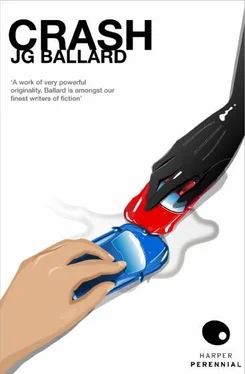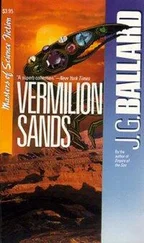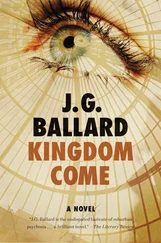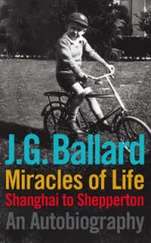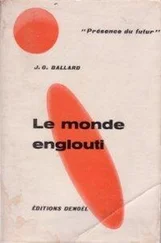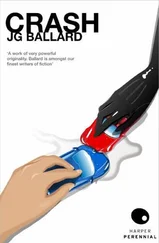Vaughan had frightened me. The callous way in which he had exploited Seagrave, playing on the violent fantasies of this punch-drunk stunt-driver, warned me that he would probably go to any lengths to take advantage of the immediate situation around him.
I accelerated as the traffic reached the Western Avenue interchange, then moved northwards at the first right-hand junction towards Drayton Park. Like an up-ended glass coffin, the apartment block lifted into the sky over my head as I drove back into the basement garage.
In the apartment I wandered about restlessly, searching for the dictation pad on which Catherine recorded her telephone calls. I wanted to intercept any messages from her lovers, not out of sexual jealousy, but because these affairs would cut irrelevantly across whatever Vaughan was planning for us all.
Catherine had been untiringly generous and affectionate to me. She continued to urge me to see Helen Remington, so much so that at times I thought she was laying the ground for a free consultation, marked by strong lesbian overtones, about some obscure gynaecological complaint—the intercontinental pilots with whom she fraternized probably carried more diseases than all the terrified immigrants herded through Helen Remington’s bureaux.
Searching for Vaughan, I spent the morning haunting the approach roads to the airport. From the parking aprons of the filling stations along Western Avenue I watched the oncoming traffic. I hung about the observation platform of the Oceanic Terminal, hoping to see Vaughan trail a visiting pop star or politician.
In the distance the traffic moved sluggishly along the exposed deck of the flyover. For some reason I remembered Catherine saying once that she would never be satisfied until every conceivable act of copulation in the world had at last taken place. Somewhere in this nexus of concrete and structural steel, this elaborately signalled landscape of traffic indicators and feeder roads, status and consumer goods, Vaughan moved like a messenger in his car, his scarred elbow resting on the chromium window-sill, cruising the highways in a dream of violence and sexuality behind an unwashed windshield.
Giving up my attempt to find Vaughan, I drove to the studios at Shepperton. A large breakdown truck blocked the gates. The driver hung from his cab, shouting at the two commissionaires. On the back of the truck lay a black Citroen Pallas saloon car, its long bonnet crushed by a head-on collision.
‘That terrible machine.’ Renata joined me in the sunlight as I parked my car. ‘Did you order it, James?’
‘It’s needed for the Taylor film—there’s a crash sequence being taken this afternoon.’
‘She’ll drive that car? Don’t tell me.’
‘She’ll drive another car—this one is used for the post-crash sequences.’
Later that afternoon I thought of Gabrielle’s crippled body as I looked down over the make-up woman’s shoulder at the infinitely more glamorous and guarded figure of the screen actress sitting behind the wheel of the crashed Gtroen. At a discreet distance the sound and lighting men watched her like spectators at a real accident. The make-up woman, a refined girl with a reassuring sense of humour—so unlike those casualty ward nurses whose opposite number, in a sense, she was—had worked for more than hour on the simulated wounds.
The actress sat motionlessly in the driving seat as the last brushstrokes completed the elaborate lacework of blood that fell from her forehead like a red mantilla. Her small hands and forearms were streaked with the blue shadows of simulated bruises. Already she was assuming the postures of a crash victim, her fingers weakly touching the streaks of carmine resin on her knees, thighs delicately raised from the plastic seat cover as if flinching from some raw mucous membrane. I watched her touch the steering wheel, barely recognizing the structure.
In the dashboard locker below the buckled instrument panel lay a woman’s dusty suede glove. Did the actress sitting in the car under her death-paint visualize the real victim injured in the accident that had crushed this vehicle—some Francophile suburban housewife, perhaps, or Air France stewardess? Did she instinctively mimic the postures of this injured woman, transforming in her own magnificent person the injuries of a commonplace accident, the soon-forgotten bloodstains and sutures? She sat in the damaged car like a deity occupying a shrine readied for her in the blood of a minor member of her congregation. Although I was twenty feet from the car, standing beside a sound engineer, the unique contours of her body and personality seemed to transform the crushed vehicle. Her left leg rested on the ground, the door pillar realigning both itself and the dashboard mounting to avoid her knee, almost as if the entire car had deformed itself around her figure in a gesture of homage.
The sound engineer turned on his heel, jarring my elbow with his boom microphone. As he apologized a uniformed commissionaire jostled past me. An altercation had broken out on the opposite corner of the highway junction which had been built on this outdoor set. The young American assistant producer was remonstrating with a dark-haired man in a leather jacket, trying to take a camera away from him. As the sunlight glanced off the zoom lens I recognized Vaughan. He was leaning against the roof of a second Citroen, staring at the producer and now and then fending him off with a scarred hand. Beside him, Seagrave was sitting on the bonnet of the car. His blond hair was tied in a knot on the top of his head, and over his jeans he wore a woman’s fawn suede driving coat. Beneath his red polo-necked jumper a well-stuffed brassiere formed the contours of two large breasts.
Seagrave’s face had already been made up to resemble the screen actress’s, mascara and pancake darkening his pale skin. This immaculate mask of a woman’s face resembled a nightmare parody of the actress, far more sinister than the cosmetic wounds at that moment being applied to her. I assumed that Seagrave, wearing a wig over his blond hair and the same clothes as the actress, would drive this intact Citroen into a collision with the third vehicle containing a mannequin of her lover.
Already, as he watched Vaughan from behind his grotesque mask, Seagrave looked as if he had been obscurely injured in this collision. With his woman’s mouth and over-bright eyes, his dyed blond hair fastened into a bun on top of his head, he resembled an elderly transves-tite caught drunk in his boudoir. He watched Vaughan with some resentment, as if Vaughan had forced him to dress up each day in this parody of the actress.
Vaughan had pacified the assistant producer and the commissionaire, without having to surrender his camera. He gave Seagrave a cryptic signal, his scarred mouth breaking into a smile, and sidestepped towards the production offices. As I approached, he beckoned me forwards, incorporating me into an instant entourage.
Behind him, forgotten now by Vaughan, Seagrave sat alone in the Citroen like a distraught witch.
‘Is he all right? You should have photographed Sea-grave.’
‘I did—of course.’ Vaughan slung the camera on to his right hip. Wearing the white leather jacket he resembled a handsome actor more than a renegade scientist.
‘Can he still drive a car?’
‘As long as it moves in a straight line for him.’
‘Vaughan, get him to a doctor.’
‘That would spoil everything. Besides, I can’t spare the time. Helen Remington has seen him.’ Vaughan turned his back on the set. ‘She’s joining the Road Research Laboratory. There’s an Open Day in a week’s time—we’ll all go together.’
‘That’s the sort of frolic I can well do without.’
‘No, Ballard—you’ll find it reassuring. It’s a vital section in the television series.’
Читать дальше
Конец ознакомительного отрывка
Купить книгу
